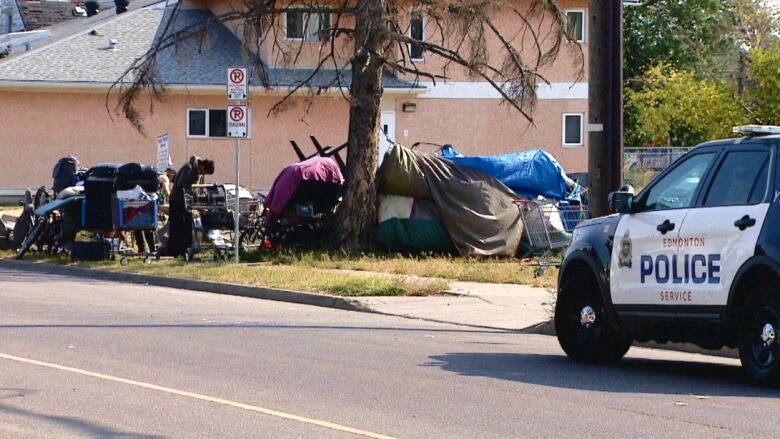Human rights group sues City of Edmonton over encampment clearing
Advocate group seeks injunction before winter

A human rights advocacy group is suing the City of Edmonton, alleging that the city's practice of clearing homeless camps violatesthe Charter of Rights and Freedoms.
The Coalition for Justice and Human Rights filed a statement of claim earlier this weekin Edmonton Court of King's Bench.
The coalition seekslegal standing to represent people experiencing homelessness in the city.
Coalition president Sam Masonsaid the group decided to take action after seeing similar legal challenges succeed in other parts of the country.
Earlier this year, an Ontario court found a municipality violated the Charter when it usedbylaws to clear encampments.
"[The city has] not provided adequate shelter spaces for the amount of folks that we have living unsheltered," Mason said in an interview this week.
"And so until they can prove that there's a place for folks to go when they displace them from their encampment, what they're doing is just unnecessary and endangers people's lives."
The city has confirmed toCBC News it is aware of the legal action and preparing to defend its approach.
Mayor Amarjeet Sohi said during a news conference Thursday that he could not talk about the lawsuit but that the city is taking a risk-based approach to encampment safety.
From Jan.1 to Aug.20,1,586 encampments have been closed with 1,453 requiring cleaning, according to data from the City of Edmonton.
From Jan. 1 to June 30, the city had dismantled 1,103 camps.
Among the remedies sought by the coalitionis a permanent injunction on displacing encampments from city-owned land when the number of unhoused people in Edmonton exceeds the number of adequate and accessible shelter beds in the city.
A city report from May notes that according to Homeward Trust's By Name List, there were between 2,650 and 2,800 Edmontonians experiencing homelessness last winter.
During that season, there were 1,202 emergency shelter spaces funded by the provincial government 627 permanent and 575 temporary and up to 150 funded by the city.
The Ontario Superior Court of Justice earlier this year found the Regional Municipality of Waterloo's use of bylaws to clear encampments violated Section 7 of the Charter the right to life, liberty and security without meeting the standards for Charter limitations set out by Section 1.
Chris Wiebe, counsel for the coalition in the Edmonton lawsuit, says previous decisions in Ontario and British Columbiaare not binding in Alberta but set a precedent.
"We hope that the Alberta Court of King's Bench will seriously consider and follow the line of authority of those provinces."
Property seizure
The Edmonton legal action also alleges additional Charter violations on top of Section 7, including parts of Section 2 freedom of peaceful assembly and freedom of association and Section 12 the right not to be subjected to any cruel and unusual treatment or punishment.
Clearing individuals from encampments decreases their abilities to provide for their basic needs and deprives them of contacts with essential supports and social workers, the lawsuit claims.
It says displacements are ineffective at accomplishing city objectives because they don't decrease problems but only move them.
It also alleges City of Edmonton employees and agents have damaged and confiscated property without compensation, violating Section 8 of the Charter the right to be secure against unreasonable search or seizure as well as the Alberta Personal Property Bill of Rights.
"The City of Edmonton commonly takes people's personal property who are living in encampments," Wiebe said.
"That includes things like propane tanks, propane-powered stoves, any property that someone is unable to pack and take with them."
The lawsuit also claims the policy violates Section 15 the right to be equal under the law because the displacement disproportionately impacts marginalized individuals, including Indigenous people.
None of the lawsuit's allegations have been proven in court.
City solicitor Michelle Plouffe said the city is reviewing the documents and preparing to discuss its bylaws, practices and commitments in court.
"While we will not debate the legal elements of the case outside the courtroom, we will simply say that we are preparing to vigorously defend the city's balanced approach to keeping people safe while working with our partners to seek long-term solutions to ending houselessness in Edmonton," Plouffe said in an emailed statement to CBCon Wednesday.
Wiebe said the coalition hopes to see a pause on displacements before the winter as last year's cold season saw a spike in frostbite and amputations.
The coalition plans to be in court on Sept. 8 seeking an interim injunction to prevent the city from clearing encampments when it doesn't have enough shelter beds for the people it displaces. The group also seeks an interim injunction to prevent the city from taking homeless people's personal property.
"I think there's a lot of unspoken fear that unhoused people pose safety risks, but there's very little consideration in the public safety discourse for the impacts on unhoused people safety in how the city of Edmonton responds," Wiebe said.
"The encampments that we're seeing right now are like nothing we've seen before," said Lina Meadows, manager of adult programs at Boyle Street Community Services.
"It's because the demand cannot be met by the social agencies that currently exist."
Meadows said until agencies, governments, housing, and law enforcement develop a cohesive plan, more people will be displaced as the root cause remains unaddressed.
With files from Natasha Riebe and Travis McEwan












_(720p).jpg)


 OFFICIAL HD MUSIC VIDEO.jpg)
.jpg)



























































































